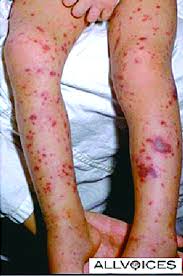Blog
N. meningiditis ~ another baddie!

As we move into summer and think about teens moving forward to middle school, high school, sports camps and onto college dorms, we need to talk about N. meningitiditis (also known as meningococcus) infections. Meningococcus is a bacteria that is carried by about 10% of people with no symptoms. It is spread via respiratory and throat secretions from coughing and kissing. It needs close contact to spread so it is not as casually contagious like the common cold or influenza.
The disease affects primarily children under the age of 1y with the highest incidence of cases seen in adolescents and young adults ages 16-23y. The bacteria most commonly causes meningitis (swelling of the brain and spinal cord) and bacteremia (blood infection). The blood infection will create damage to the blood vessels that can lead to loss of limbs. This damage also causes bleeding into the skin and the rash seen here.

Despite antibiotics, the illness can be fatal within hours. About 15% of of people with meningococcal disease will die (mortality). About 20% will have loss of limbs, deafness, brain damage or other neurological deficits (morbidity). All told there is a 35% risk of mortality or morbidity with this disease.
Highest risk populations:
Microbiologists who work with the bacteria in labs
Exposure to an outbreak - anyone exposed to a person with illness should receive preventative antibiotics
First year college students living in dorms
Military recruits
Immune compromised patients
Symptoms:
Fever Nausea/vomiting
Headache Light sensitivity
Stiff neck Altered mental status
There are 5 strains of N. meningiditis that cause illness ~ A, B, C, W and Y. Menactra and Menveo contain A, C, W and Y strains. Trumemba and Bexsero contain only the B strains. However, the data is inconclusive that the menB vaccines will protect against all strains and provide herd or community immunity. In addition, the numbers of menB disease is quite low. The Advisory Committee on Immunization Practices (ACIP) has not been able to conclusively recommend the menB vaccines. Thus, many physician offices do not offer the B strain vaccine currently. Families interested in B strain vaccines should contact local health departments which often carry these vaccines. Most teens receive only Menactra or Menveo.
 Microscope view of meningococcal bacteria
Microscope view of meningococcal bacteria
The recommendation for vaccination is at age 12y or middle school entry with a booster to be given at 17y of age prior to high school graduation as young adults look to move to dorms or apartment living.
Teen bacterial meningitis is a serious, aggressive illness and is very difficult to treat. It is highly preventable and vaccination of all teens should be considered just as the meningitis vaccines for infants and toddlers. (See blog posts http://www.wholekidspediatrics.com/blog/article/h.-influenzae-infections and http://www.wholekidspediatrics.com/blog/article/streptococcus-pneumonia-s.-pneumonia).
Interested in keeping a natural home remedy medicine cabinet but need some help? Go to http://www.wholekidspediatrics.com/yoga-and-wellness, drop in your email in the pop-up box and you will get the FREE downloadable Wholistic Medicine Guide.
Nutrition & Yoga for Back and Spine Health is coming up!
Saturday, June 9th from 10:30-11:30am at Whole Yoga & Wellness
No yoga experience needed. Learn nutritional and yoga strategies to prevent and heal back pain and strain.
Join us!
